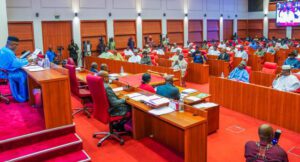Business communication and the role of correct tense application (2)
By Goke Ilesanmi Tenses and discourse accuracy
Last week, we said the issue of tenses is very important because tense is any of the verb forms relating time to action. We said there is actually a problem when we cannot accurately relate time to action and use the appropriate tenses in a given business situation. We discussed types of tense. We explained that Simple Present Tense refers to habitual or permanent actions. As for Simple Past Tense, we said it is used for expressing an action that took place before the present time. We educated that Present Continuous Tense is structurally formed through combination of any of the auxiliary verbs or verb “to be” and the present participle (-ing) form of the verb involved.
Past Continuous Tense
This is the past form of the last tense. It is used in a situation where one past action was completed while another was still in progress. In this type of situation, it is used for the longer unfinished action while simple past tense is used for the shorter one, e.g. “We saw him when he was going to school”. It is also used in a situation where two actions were taking place at the same time in the past, e.g. “Segun was reading while Gbenga was writing”.
Present Perfect Tense
This is formed through the combination of has or have and the past participle form of the verb involved, e.g. “I have written the note”. This tense tells us about a completed action with present relevance. The past participle form of a verb is its third form. For instance, a verb such as “Go” has “Went” as past tense and “Gone” past participle. For “Write”, we have “Wrote” as past tense and “Written” as past participle.
Different forms of each verb are written against it in the short forms “pt” and “pp” in the dictionary. You also have these different forms of every verb at the end (or beginning) of any standard dictionary. Present Perfect Tense is a form of present tense, especially that it does not mention the time that the completed action took place but only expresses its relevance to the present time. Note that when you mention a specific date or time in the past, you cannot use present perfect, e.g. “I have seen him in the morning”. This is wrong. The correct form should have been “I saw him in the morning”. However, it is possible to say “I have seen him this morning” if we are still in the morning time.
Past Perfect Tense
This is the past form of the present perfect. It is formed through the combination of had and the past participle form of the verb involved. This tense is otherwise called pluperfect, remote past or past before past. It is used for the earlier of two actions that took place in the past, while the simple past is used for the one that happened later, e.g. “I had gone before he came”. Like the present perfect, past perfect tense is not used when a specific date or time is mentioned in the past. However, this rule is broken, especially if two actions took place in the past with one happening earlier, and the speaker wants to emphasise the date or time of the earlier action.
In this type of situation, commas are usually employed to separate the area of time, to make it look like an intrusive element, that is, something that can be removed. An example of this can be drawn from preface to the first edition of Roget’s Thesaurus of English Words and Phrases by Betty K. MA: “…Conceiving that such a compilation might help to supply my own deficiencies, I had, in the year 1805, completed a classified catalogue of words on a small scale, but on the same principle, and nearly in the same form, as Thesaurus now published….”
It is common in (Nigerian) journalism to misuse past perfect tense. Look at this sentence, for example: “President Buhari had on Tuesday confirmed the matter”. If it is the case that the president confirmed the matter again on Wednesday, it is correct to use past perfect tense like this for that of Tuesday that was earlier. Similarly, if the president denied the matter on Wednesday, then we can use this statement like this, but commas will still be required to separate On Tuesday.
However, if it is the case that the president only confirmed this on Tuesday alone, without re-confirmation or denial after this day, it is wrong to write the above expression in past perfect tense. Instead, it is more grammatically correct to use simple past tense and change the position of “On Tuesday”, e.g. “President Buhari confirmed the matter on Tuesday”.
*Note: it is “You had better do….” not “You had better done”. This is because “Had” here means “Should”.
Simple Future Tense
This tense is used to express simple futurity. Here, the first person singular pronoun I and plural “We” make use of the modal auxiliary verb “Shall” to express simple futurity, e.g. “I/We shall go today.” However, second-person singular and plural “You”, third person singular pronouns “He”, “She” and “It” and third person plural pronoun “They” use “Will” to express their simple futurity, e.g. “He/She/It/You/They will go today.”
In spoken English, it is “Will” that is more commonly used for all persons. But the implication of this indiscriminate use of “Will” is that a listener may not know whether a speaker is expressing simple futurity or expressing a promise, especially when Will is used with “I” and We. The reason being that when it comes to expressing a promise, I and We make use of “Will”, while other pronouns employ “Shall”. Another way of expressing futurity is by using “going-to” with an infinitive. This is called Future of Intention, e.g. “I am going to see him tomorrow.”
To be continued
PS: For those making inquiries about our Public Speaking, Business Presentation and Professional Writing Skills programme, please visit the website indicated on this page for details.
GOKE ILESANMI (FIIM, FIMC, CMC), CEO of Gokmar Communication Consulting, is an International Platinum Columnist, Professional Public Speaker, Career Mgt Coach and Certified Mgt Consultant. He is also a Book Reviewer, Biographer and Editorial Consultant.
Tel: 08055068773; 08187499425
Email: gokeiles2010@gmail.com
Website: www.gokeilesanmi.com.ng




